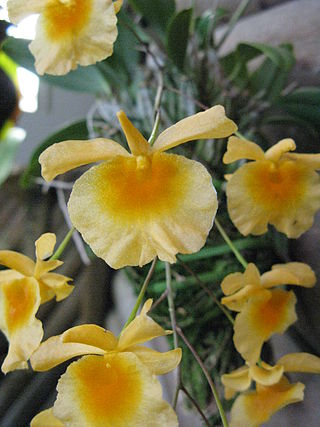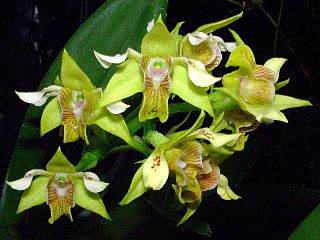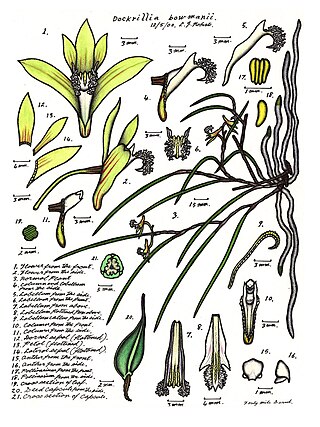
Dendrobium is a genus of mostly epiphytic and lithophytic orchids in the family Orchidaceae. It is a very large genus, containing more than 1,800 species that are found in diverse habitats throughout much of south, east and southeast Asia, including China, Japan, India, the Philippines, Indonesia, Australia, New Guinea, Vietnam and many of the islands of the Pacific. Orchids in this genus have roots that creep over the surface of trees or rocks, rarely having their roots in soil. Up to six leaves develop in a tuft at the tip of a shoot and from one to a large number of flowers are arranged along an unbranched flowering stem. Several attempts have been made to separate Dendrobium into smaller genera, but most have not been accepted by the World Checklist of Selected Plant Families.

Dendrobium cuthbertsonii is a species of orchid in the genus Dendrobium. It grows epiphytically at up to 10,000 feet (3,000 m) above sea level in New Guinea and the Bismarck Archipelago. It is targeted by commercial collectors who harvest it for export. It has one of the longest floral durations of any orchid, with individual flowers remaining open for up to nine months. Another source says ten months. Its stems are 1–2 centimetres (0.4–0.8 in) tall and 4–7 millimetres (0.16–0.28 in) wide; the flowers are 25–40 mm (1.0–1.6 in) long, 13–35 mm (0.5–1.4 in) wide, and extremely variable in colour., ranging from crimson through orangey-red.

Dendrobium lindleyi, also known as Dendrobium aggregatum, is a plant of the genus Dendrobium. They are found in the mountains of southern China and Southeast Asia.

Dendrobium speciosum, commonly known as the rock orchid or cane orchid, is a species of highly variable Australian orchid. Its varieties can be found in a range of habitats as epiphytes or lithophytes. It has a continuous distribution along the east coast of Australia and in distinct populations along the Tropic of Capricorn. As a lithophyte, it forms gigantic spreading colonies on rocks and cliff faces, often exposed to full sun, with its roots forming dense, matted beds across the rock that anchor the plant. It can be found at altitudes from sea level to 900 metres (3,000 ft).

Dendrobium nobile, commonly known as the noble dendrobium, is a member of the family Orchidaceae. It has become a popular cultivated decorative house plant, because it produces colourful blooms in winter and spring, at a time when little else is in flower. It is also one of the 50 fundamental herbs used in traditional Chinese medicine, known as shí hú or shí hú lán. Dendrobium nobile is one of the most widespread ornamental members of the orchid family. Its blooms are variegated in colour, shading from white through pink and purple, and the many different cultivated varieties produce different sized and coloured blooms.

Dendrobium parishii is a species of orchid native to Asia.

Dendrobium amabile is a species of orchid endemic to Vietnam.

Dendrobium anosmum is a species of epiphytic orchid. It is widespread across Southeast Asia from Sri Lanka to New Guinea, including Indochina, Indonesia, the Philippines, etc. In 1839, the scented variety was first discovered by Lindley in the Philippines and named Dendrobium macrophyllum, which later on considered as homonym of other species. Six years later, the unscented variety was discovered again in the Philippines, hence, the botanical nomenclature until to this date.

Dendrobium chrysotoxum is a widely cultivated species of orchid. It is native to Southeast Asia, growing naturally in Myanmar, Bhutan, Yunnan, China, Manipur, Assam, India, Bangladesh, Andaman Islands, Laos, Nepal, Thailand, and Vietnam.

Dendrobium gratiosissimum, the very graceful dendrobium, is a species of orchid. It is native to Thailand, Vietnam, Laos, Myanmar, Yunnan, and Assam.

Dendrobium jenkinsii, the Jenkins's dendrobium, is a species of orchid. It is native to southern China (Yunnan), the eastern Himalayas and northern Indochina.

Dendrobium macrophyllum, commonly known as the large-leaved dendrobium or pastor's orchid, is a species of Orchid.

Dendrobium moniliforme, known as Shihu in Chinese and Sekkoku in Japanese, is a species of orchid. It is native to Japan, Korea, China, the Himalayas, and northern Indochina.

Dendrobium moschatum, the musky-smelling dendrobium, is a species of orchid. It is native to the Himalayas, and Indochina.

Dendrobium thyrsiflorum is a species of orchid, commonly called the pinecone-like raceme dendrobium. It is native to the Himalayas as well as to the mountains of northern Indochina.

Dendrobium wattii is a species of orchid. It is native to the Himalayas and to Indochina.

Dendrobieae is a tribe in the subfamily Epidendroideae, in the family Orchidaceae. The Dendrobieae are mostly tropical, epiphytic orchids which contain pseudobulbs.

Dendrobium plicatile is an Asian orchid species, a member of the genus Dendobium. It was formerly described as Flickingeria fimbriata.

Dendrobium bowmanii, commonly known as the straggly pencil orchid, is an epiphytic or lithophytic orchid in the family Orchidaceae. It has thin wiry, straggly stems with a small number of small leaves and up to four greenish or brownish flowers with a conspicuous white labellum. It grows in drier rainforests and coastal scrub in New South Wales, southern Queensland and New Caledonia.




















